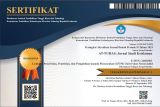Study of Living Hadith; the Phenomenon of Different Religious Inheritance through Wasiat Wajibah
(1) * Muhammad Zainuddin Sunarto

 (UIN Maulana Malik Ibrahim, Malang)
(UIN Maulana Malik Ibrahim, Malang) Indonesia
(2) Umi Sumbulah (UIN Maulana Malik Ibrahim, Malang)
Indonesia
(*) Corresponding Author
AbstractThe Compilation of Islamic Law specifies that wills are only required for adopted children and their adoptive parents. The parties involved may petition the courts, even though these regulations are less binding. This research uses the type of normative legal research because what is examined in this research is the norm contained in the hadith texts related to the inheritance law above. The case approach is used as an approach in research because the case of inheritance of different religions that are discussed in a separate case within the family sphere, where there is no legal argument or norm that can answer the case above, so the case approach. The research results show that in Article 209 of the Kompilasi Hukum Islam (KHI), describe the law of Wasiat Wajibah. It cannot, therefore, be regarded contrary to Islamic law. Because leaving a bequest to an adopted kid or adoptive parent does not conflict with the general requirements of the Qur'an and the Prophet's Sunnah. The Cassation Decision No. 368 K/Ag/1995, issued 16 July 1998, marked the beginning of the practice of non-Muslim heirs obtaining a portion of the inheritance from Muslim heirs via Wasiat Wajibahs, which created a body of law within the Religious Courts. Non-Muslims inherit the same proportion of their Muslim parents' required bequests as other Muslim heirs. This necessary will is intended to preserve the integrity of the family and accommodate the multicultural, multiethnic, and multireligious nature of Indonesian society. In addition, implementing a sense of fairness is an advantage of this decision. Giving wills to non-Muslim spouses, children, parents, and relatives has contributed to the revival of Islamic law in Indonesia, demonstrating a sense of social fairness. |
Keywords
Full Text: PDF
Refbacks
- There are currently no refbacks.
Copyright (c) 2022 Muhammad Zainuddin Sunarto, Umi Sumbulah
This journal is licensed under a
Creative Commons Attribution-ShareAlike 4.0 International License





.png)






